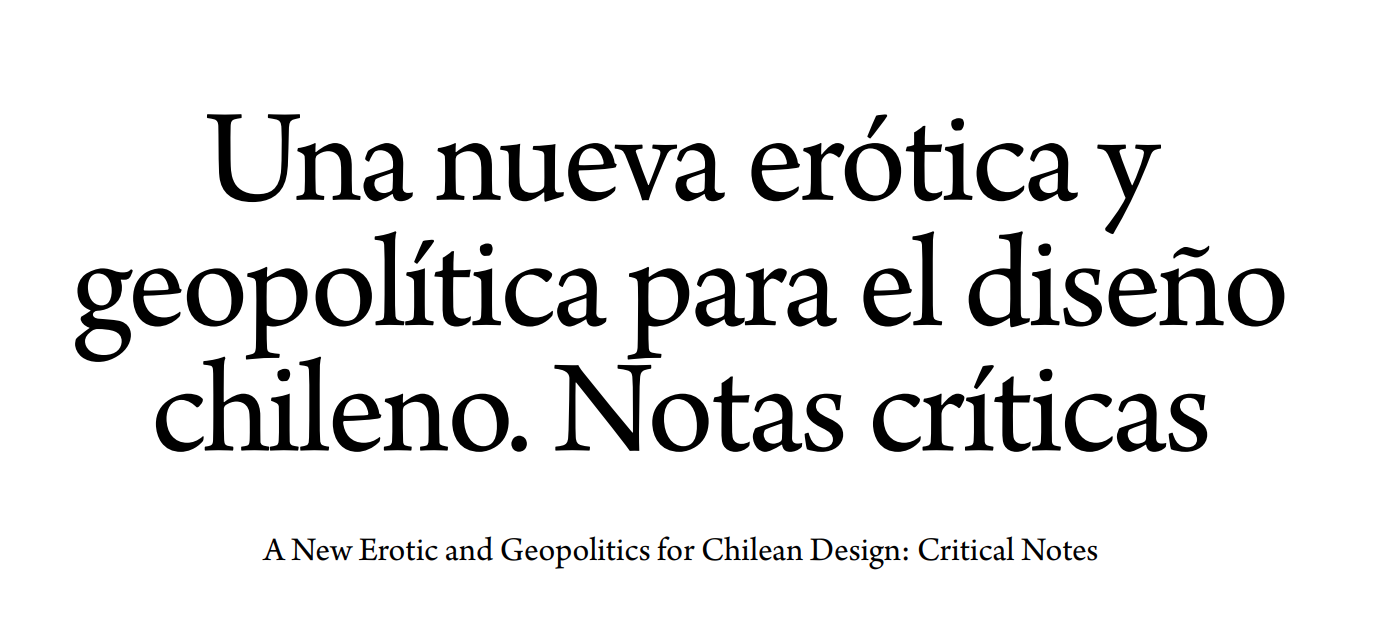A New Erotic and Geopolitics for Chilean Design: Critical Notes
DOI:
https://doi.org/10.46516/inmaterial.v10.208Keywords:
Design, Eurocentrism, eroticism, decolonialism, possible other.Abstract
This article is located within the framework of reflection on the need for a new geopolitics of design and within a decolonial perspective of knowledge. It is argued that if Chilean design is conceived as a way of projecting worlds, ethical, environmental and social responsibility demands a renewed eroticism and forms of knowledge that leave few margins for conceptual ambiguity, spurious purposes and individuation. A repositioning of the field through an epistemological ecology implies questioning what has been generated conceptually and axiologically under the empire of consumption and in conditions of social and environmental crisis, considering a new horizon of what is possible, from autonomous and temporally linked processes. It is argued that prospectively there are possibilities for different presents and futures in the face of the Eurocentric hegemony that is at the founding basis of Chilean design.Downloads
References
Aguilar, L. 1996. La hechura de las políticas. México: Miguel Ángel Purrua
Amin, S. 1989. El Eurocentrismo. Crítica a una ideología. México: Siglo XXI.
Amin, S. 1988. La desconexión. Hacia un sistema mundial policéntrico. Madrid: IEPALA.
Bitar, S. 2022 (Ed) Estrategia industrial de Chile para la década de los años 70. Documentos inéditos 1969-1970. Santiago: Ariadna Ediciones.
Bonsiepe, G. 2016. Del archipiélago de proyectos. Diseño industrial en Chile 1971-1973. Argentina: Nodal.
Borries von, F. 2019. Proyectar mundos. Una teoría política del diseño. Santiago: Ediciones Metales Pesados.
Bourdieu, P. 1998. La distinción. Criterios y bases sociales del gusto. Madrid: Taurus.
Bourdieu, P. 1988. Cosas Dichas. Barcelona: Gedisa.
Bourdieu, P. 1990. Sociología y cultura. México: Grijalbo.
Callon, M. 1992. “El proceso de construcción de la sociedad. El estudio de la tecnología como herramienta para el análisis de sociológico,” en M. Domènech y Tirado (eds.) (1998) Sociología Simétrica. Ensayos sobre Ciencia,Tecnología y Sociedad, pp.143-170. Barcelona: Gedisa.
Castro-Gómez, S. y Grosfoguel, R. 2007. El giro decolonial. Reflexiones para una diversidad epistémica más allá del capitalismo global. Bogotá: Siglo del Hombre.
Coo, D. y Ríos, S. 2010. “Cambio estructural de la industria manufacturera en chile: 1979-2004”. En Revista de Economía Mundial 26, pp. 27-51.
Crutzen, P. y Stoermer, E. 2000. “The ‘Anthropocene’”, en Global Change Newsletter, núm. 41, pp. 17-18.
Domènech, M., & Tirado, F. J. 1998. Claves para la lectura de textos simétricos. En Sociología simétrica. Ensayos sobre ciencia tecnología y sociedad, pp. 13-50. Barcelona: Gedisa.
Durkheim, É. 1987. La división del trabajo social. Madrid Akal.
Escobar, A. 2018. Otro posible es posible: Caminando hacia las transiciones desde AbyaYala/Afro/Latino-América. Bogotá, Colombia: Desde Abajo.
Escobar, A. 2003. “Mundos y conocimientos de otro modo”. En Tabula Rasa, N°.1: p. 51-86.
Foucault, M. 1999. El orden del discurso. México: Tusquets Editores.
Gorz, A. 1992 “L'écologie politique entre expertocratie et autolimitation”. Dans Actuel Marx 1992/2 (n° 12), p. 15-29. Éditions Presses Universitaires de France https://doi.org/10.3917/amx.012.0015
Kuhn, T. 2004. La estructura de las revoluciones científicas. Fondo de Cultura Económica: México.
Latour, B. 1998. “De la mediación técnica”, en M. Domènech y F. Tirado (eds.) Sociología Simétrica. Ensayos sobre Ciencia, Tecnología y Sociedad, pp. 29-64. Barcelona: Gedisa.
Latour, B. 1999. La esperanza de Pandora. Barcelona: Gedisa.
Latour, B. 2005 Reassembling the social: an introduction to actor-network theory. Nueva York: Oxford University Press.
Latouche, S. 2014. Límite, Buenos Aires: Adriana Hidalgo Editora.
Latouche, S. 2009. Pequeño tratado del decrecimiento sereno. Barcelona, Icaria.
Latouche, S. 2008. La apuesta por el decrecimiento: ¿Cómo salir del imaginario dominante? Barcelona: Icaria.
Mondragón, H. y Mejía, C. 2015. “Sudamérica y las formas de lo moderno”. En Sudamérica moderna. Objetos, edificios, territorios, p. 16-37. H. Mondragón (ed) y C. Mejía (co-ed). Santiago: Arq Ediciones, Pontificia Universidad Católica de Chile.
Moore, J. 2000. El capital en la trama de la vida. Ecología y acumulación de capital. Madrid: Traficantes de Sueños.
Nussbaum, M. C. y Sen, A. 1998. La calidad de vida. México: Fondo Cultura Económica.
Patrouilleau, M. 2022. “Epistemología y crítica de la prospectiva y los estudios del futuro. Una visión desde América Latina”. En Prospectiva y Estudios del Futuro. Epistemologías y Experiencia en América Latina, p.21-50. Patrouilleau, M. y Albarracín, J. (Coordinadores). Bolivia: CIDES-UMSA.
Quijano, A. 1992. “Colonialidad y modernidad/racionalidad”. En Perú Indígena. Lima: Instituto Indigenista Peruano. Vol. 13. N° 29, p. 11-20.
Said, E. 1996. Said, E. Cultura e imperialismo. Barcelona: Anagrama.
Salazar, G. y Pinto, J. 2014. Historia contemporánea de Chile. Estado, legitimidad, ciudadanía. Santiago: LOM.
Sen, A. 2000. Desarrollo y Libertad. Buenos Aires: Editorial Planeta.
Sen, A. (1998). Bienestar, justicia y mercado. Barcelona: Ediciones Paidós Ibérica.
Shiva, V. y Shiva, K. (2020). Unidad versus el 1%. Rompiendo ilusiones, sembrando libertad. Santiago: LOM.
Schumacher , E. 1978. Lo pequeño es hermoso. Hoshiko.
Sousa Santos de, B. 2016. Descolonizar el saber, reinventar el poder. Santiago: LOM-Trilce.
Taibo, C. 2014. ¿Por qué el decrecimiento? Un ensayo sobre la antesala del colapso.Barcelona: Los libros del lince.
Tsing, A. 2023. Los hongos del fin del mundo. Sobre la posibilidad de vida en las ruinas capitalistas. Ciudad Autónoma de Buenos Aires: Caja Negra.
Vargas Callegari, R., Rodríguez Torrent, J. C. 2024. “Repercusiones de la dictadura cívico-militar en la identidad profesional del diseño en Chile”. En Revista Kepes (en edición).
Vargas Callegari, R., & Rodríguez Torrent, J. C. 2019. “Profesionalización del Diseño en Chile, una sinfonía en cuatro movimientos”. RChD: Creación Y Pensamiento, 4(6). https://doi.org/10.5354/0719-837X.2019.53636
Vera, R. 2015. “Un caso de diseño y de producción moderna. Orígenes de la Dirección de Aprovisionamiento del Estado (DAE)”. En Sudamérica moderna. Objetos, edificios, territorios, p. 84-97. H. Mondragón (ed) y C. Mejía (co-ed). Santiago: Arq Ediciones, Pontificia Universidad Católica de Chile.
Von Borries, F. (2019). Proyectar mundos. Una teoría política del diseño. Santiago: Ediciones Metales Pesados.
Weber, M. (2006). Sobre la teoría de las ciencias sociales. México: Ediciones Coyoacán.
Zafra, R. (2019). El entusiasmo. Precariedad y trabajo crativo en la era digital. Barcelona: Anagrama.

Published
How to Cite
Issue
Section
License
Copyright (c) 2025 Juan Carlos Rodríguez Torrent, Rodrigo Vargas Callegari

This work is licensed under a Creative Commons Attribution-ShareAlike 4.0 International License.






